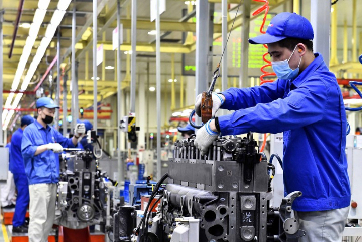-
Tel:+86 18948187408


cross border logisticsThe purchasing managers' index (PMI) for China's manufacturing sector came in at 49 in July, down from 50.2 in June, data from the National Bureau of Statistics (NBS) showed Sunday. The non-manufacturing business activity index was 53.8 and the composite PMI output index was 52.5 in July, remaining in expansion territory for two consecutive months. On the whole, the foundation of economic recovery needs to be stabilized, the NBS said.
July is the traditional low production season. The lack of market demand release, the lowered boom of high energy consumption industry and other factors dragged down PMI in July, NBS senior statistician Zhao Qinghe said on Sunday.
Among the 21 industries surveyed, the PMI of 10 industries was in the expansion range, among which the PMI of agricultural and sideline food processing, food and beverage and refined tea, special equipment, automobile, rail, ship, aerospace equipment and other industries was higher than 52.0, maintaining expansion for two consecutive months, and the production and demand continued to recover, said Zhao.
The PMI of energy-intensive industries, such as textiles, oil, coal and other fuel processing, ferrous metal smelting and rolling processing, continued to be in the contraction zone, significantly lower than the overall level of the manufacturing sector, which was one of the main factors behind this month's decline.
Zhao said that the price index fell markedly. The purchase quantity index of July was 48.9, down 2.2 percentage points from the previous month.
Influenced by fluctuations in the prices of oil, coal, iron ore and other international commodities, the purchase price index of major raw materials and the producer price index were 40.4 and 40.1, respectively, down 11.6 percentage points and 6.2 percentage points from the previous month, per NBS statistics.
Among them, ferrous metal smelting and the rolling processing industry were the lowest among the surveyed sectors, and raw material purchase prices and product ex-factory prices have fallen significantly.
Energy-intensive industries are mainly affected by the turbulence in prices of international commodities, Ye Qing, a professor at the Zhongnan University of Economics and Law in Wuhan, told the Global Times.
"Due to the sharp fluctuations in the price level, the wait-and-see sentiment of some enterprises increased and the purchase intention weakened," said Ye.

Ye also noted that stricter requirements on environmental protection and sustainability in China affected energy-intensive industries.
The PMI for the steel industry stood at 33 in July, down 3.2 percentage points from June, remaining its sluggish trend, statistics from the Steel Logistics Professional Committee of China Federation of Logistics & Purchasing (CFLP) showed on Sunday.
From the sub-indexes, the traditional off-season market forces were in full effect, with low market demand, lower steel production, and downward prices for both steel and raw materials. In August, market demand is expected to pick up, and steel production tends to recover, leading to a small rebound in steel and raw material prices, said CFLP.
The non-manufacturing sector, however, has rebounded for two consecutive months. It shows that driven by a series of policies and measures to stabilize growth and promote consumption, as the service sector continues to recover, said Zhao.
Among the 21 industries surveyed, the business activity index of 16 industries were shown in the expansion range, among which the air transportation, accommodation, catering, ecological protection and public facilities management industries were above 60.0. The previously suppressed consumer demand continues to release, and the business volume of related industries continues to recover rapidly.
Ye also said that the economic recovery will be accelerated in the second half of the year, and will be much better on a yearly basis.
From Global Times